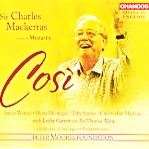Very few operas work as well in translation as Mozart’s. Not only are there lots of words, but they mean somethihg–and nuances are crucial. This new Chandos Opera-in-English version, using a century-old translation updated by John Cox, is sophisticated and clear, and the singers do the text justice. Even if you may not like opera in translation, this will fascinate you.
In addition, it’s a marvelously musical if not groundbreaking performance, with Charles Mackerras leading a period-instrument group, The Orchestra of the Age of Enlightenment. The overture is a bit scrappy, with the oboes (at about 2:35) fluffing their doodling and the strings following suit a moment later; but once you hear the exciting timpani rolls that end the overture all sins are forgiven. For the rest of the opera every instrumentalist is on his/her best behavior and they embellish freely but not showily. (The same can be said for the singers.) Mackerras’ choices of tempos are always just-so.
If there’s a basic problem with this set it’s that it is slightly too nice: the opera’s darker aspects are never really in evidence. Normally Guglielmo’s rage and disappointment in the second finale’s mock wedding scene are palpable; here he sounds miffed in a buffo sort of way. Christopher Maltman sings the role with elegance and firm tone, and he’s a good comic, but his reading (or Mackerras’) lacks pathos. And Thomas Allen’s Don Alfonso is wise and tough (and surprisingly well sung, given the man’s age) but not nearly as snide as I usually prefer. In fact, both he and Lesley Garrett, as Despina, seem to be having good, clean fun, rather than playing some sort of cruel game, which is actually what they’re doing. Garrett’s Despina is oversung and over-inflected; she’s the set’s only ham and it’s out of place.
Toby Spence is a splendid Ferrando, the voice sounding less “early music” than before, and his big duet with Janice Watson’s nicely arrogant–and stunning–Fiordiligi is one of the set’s highlights. (Spence is so good it’s a pity that his third aria is cut, as is the little duet for the men in Act 1). Diana Montague’s Dorabella avoids cuteness at all times, but I get the feeling that’s because her voice has gotten a bit heavy for the part; whatever the reason, it’s nice to hear the role sung without unnecessary perkiness.
Among the set’s strengths are the superb ensemble work and the excellent blend of the voices; as mentioned, only Garrett wishes to stand aside and be heard differently. An interpretation? I doubt it. The men can be understood almost word-for-word and the women are better than in most English-language operas. The engineers have given the recording an occasionally “boomy” high-school stairwell reverberance. If, of course, you need a terrifically sung Cosi in English, you’ll have to own this one; if the original is good enough, the 1954 Karajan, the Arnold Östman (L’Oiseau-Lyre), or the magnificent René Jacobs will fill the bill.
































